




Nine-year-old Elliot owes his life to a lot of people, including hundreds he hasn’t even met.
Elliot is back to his healthy, happy self thanks to highly skilled specialists at the Alberta Children’s Hospital and generous community members who funded the technology he needed when his life depended on it.
When Elliot began throwing up and complaining of a bad headache, his parents took him to the local hospital near their home in Eckville, where doctors suspected he had a stomach flu. The next day though, Elliot’s condition deteriorated drastically and he became unresponsive.
Paramedics rushed him to the hospital in Red Deer by ambulance. His blood pressure was spiking and he began to have seizures. Doctors there knew he needed the experts at the Alberta Children’s Hospital, so they called in the Pediatric Critical Care Transport Team to get him there safely and quickly by ambulance. Like a mobile intensive care unit, this dedicated team of specialists stabilize and transport children from smaller hospitals to the Alberta Children’s Hospital and is made possible by generous community support.
Once in the Pediatric Intensive Care Unit (PICU) at the hospital, neurologists monitored Elliot’s brain, ruling out any injury, damage or mass, while intensivists turned their attention to his kidneys. Using a portable point-of-care ultrasound, funded by supporters of the Country 105 Caring for Kids Radiothon, they discovered four tumours attached to Elliot’s adrenal glands. Each measured about three centimetres and was contributing to his dangerously high blood pressure.
“When he woke up, the first thing he said was, ‘Hi Mom’, and we all breathed a sigh of relief, but hearing he would need surgery to remove four tumours was a huge shock,” says his mom, Christy.
First his team needed to get his blood pressure under control with medication, and he was encouraged to eat a high salt diet to help keep it stable in preparation for removing the tumours. That meant a three-week stay in the PICU prior to surgery, which Elliot thought was just fine.
“His nurses treated him like a rock star,” says Christy. “They played video games with him, he ate like a king — including his favourite mac and cheese — and one nurse even took him in his wheelchair down to the cafeteria and bought him a pop.”
Then, on his 20th day in hospital, pediatric general surgeon Dr. Natalie Yanchar and her team meticulously removed all four tumours, including one close to his aorta, along with both of Elliot’s adrenal glands.
“He was able to bring his favourite stuffy, a puppy he named ‘Mom’, into the operating room with him, and when he came out of surgery, it had a dressing on its tummy too!” says Christy.
Thanks to a team of geneticists and donor-funded DNA sequencing technology at the hospital, Elliot and his family have learned he has a genetic condition making him prone to tumours in his organs. He is now closely followed by his team of endocrinologists and oncologists.
“It’s amazing how the DNA sequencer was able to give us answers so quickly and now, with our screening regimen, if another tumour pops up, we can deal with it fast,” says Christy. “We are grateful to our specialists at the hospital and generous people in the community who support them with the best technology to help kids like Elliot. To us, they are all angels.”
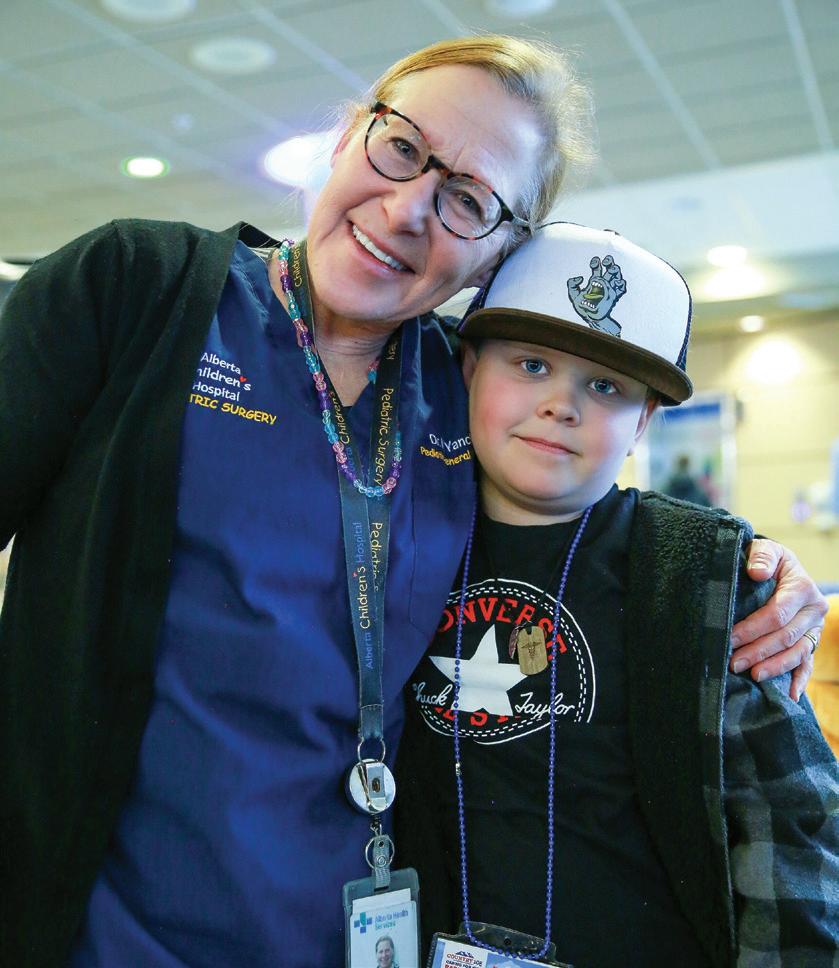
Dr. Yanchar and Elliot at the 21st annual Country 105 Caring for Kids Radiothon.
To give them the clearest view of his tumours during the complex operation, Elliot’s surgeons used equipment called a surgical retractor. By sharing his story during a special equipment power hour at the 21st annual Country 105 Caring for Kids Radiothon, Elliot inspired listeners to fund a newer, more advanced surgical retractor for the hospital.
We know when it comes to kids, the shorter, more efficient and safer the operation the better. Not only does it mean less risk of complications and exposure to anesthetic, but it also means less time a parent is away from their child. We are so grateful to Radiothon supporters for rallying behind our work and the kids we care for by raising funds for this newer retractor.”
— Dr. Natalie Yanchar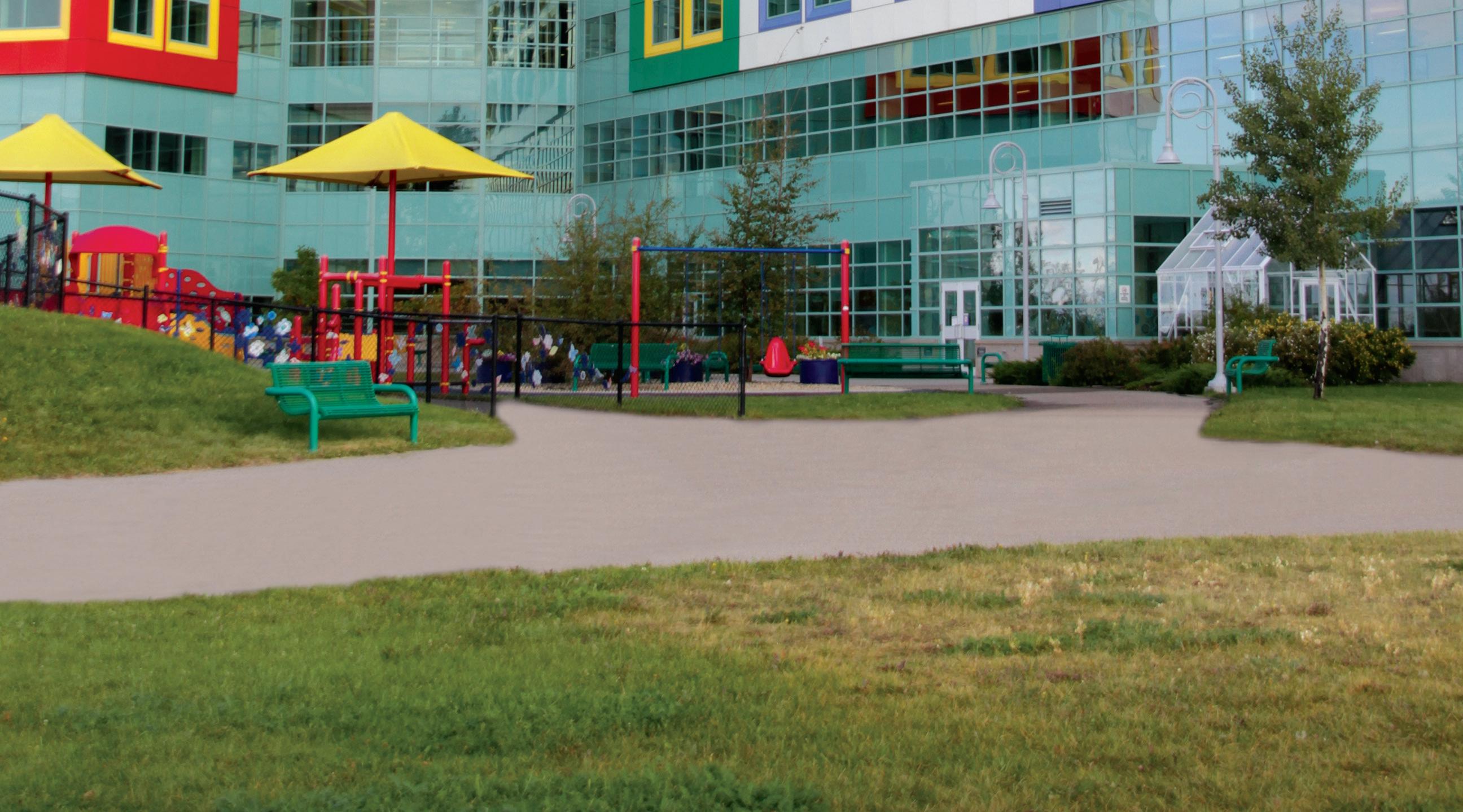

Claire Sonnenberg loves to play games with her brothers, make art for her friends and bake with her mom. What’s unique is that she can do all three using only her mind.
Claire has cerebral palsy and though she cannot walk or talk, she is intellectually intact and highly aware. In essence, she has been trapped inside her body.
Now, thanks to specialists at the Alberta Children’s Hospital and community-funded, state-of-the-art technology, she is learning to explore her world in new and exciting ways.
Experts in the Brain Computer Interface (BCI) program at the hospital are helping Claire use brain power to do things her body cannot. By wearing a special headset, Claire concentrates on certain words that signal the BCI technology to control a variety of devices — like her wheelchair.
Claire can also hone her skills at home using a portable BCI kit. For the first time in her life, and using only her mind, she can switch on toys, play video games, shoot her brothers with a foam dart gun and roll mechanical dice during family
game nights. She loves working the blender and mixer to make milkshakes and bake with her mom and has even started her own business selling treats she makes using BCI called “Claire’s Kitchen, Food By Thought.”
“BCI has opened the door to so many opportunities we never dreamed were possible for Claire,” says her mom, Stephanie. “She is learning how to express herself, gain independence and interact with our family in fun new ways.”
Claire is in Grade 2 and thrilled to be one of two children in Alberta approved to also use BCI at school as part of a pilot program. “The potential BCI holds for Claire and other children like her is so exciting, and we are so grateful to our team and this technology that has been life-changing for her,” says Stephanie.
Before meeting her BCI team, Claire learned to communicate using special ‘eye gaze’ technology that allowed her to select commands and phrases on a computer screen with her eyes. Thanks to community support of the Augmentative Communication and Educational Technology Service team at
Learn more about Claire and see BCI in action
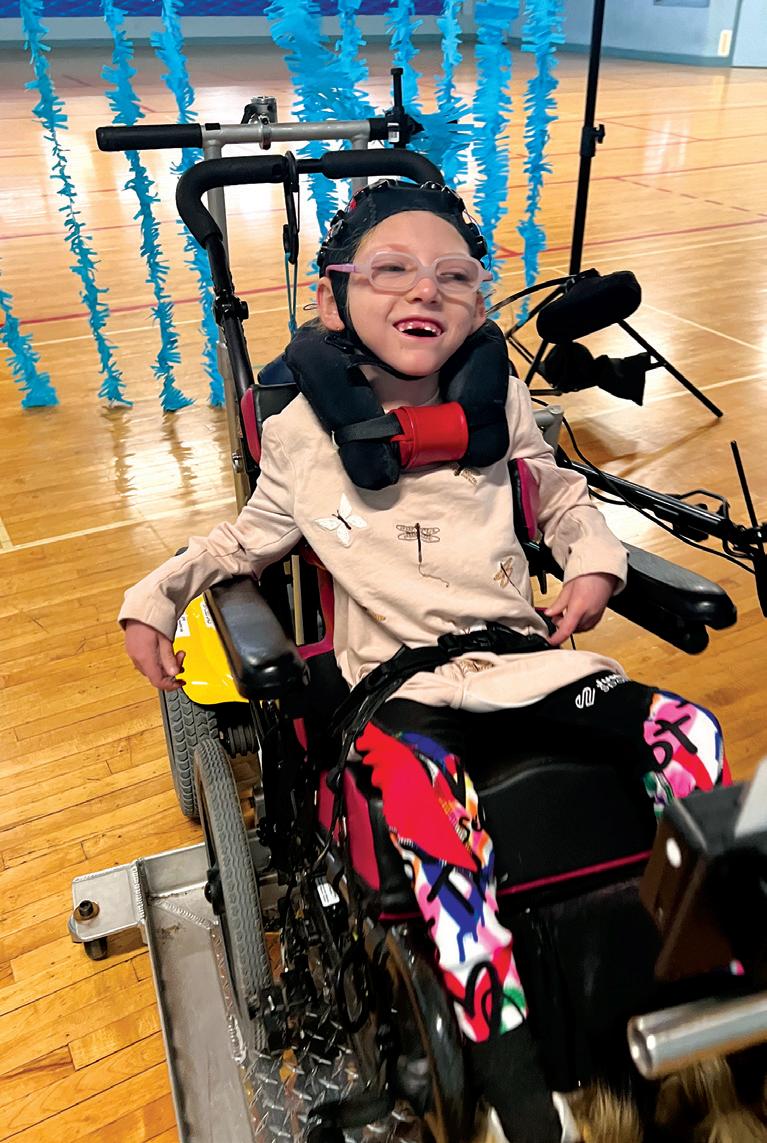
the hospital, she has been able to grow her vocabulary and better express herself with language, including phrases like “Come here,” “Be quiet,” and, most recently to her brothers, “Go away!” And it was through eye gaze that Claire first told her mom, “I love you.”
Claire is also treading new ground, quite literally, with other innovative technology called Trexo, a robotic device that is part of nation-leading research at the hospital. Her Trexo device has allowed her to experience walking, including around the mall with friends and down the aisle as a flower girl. Last year she took her 300,000th step at school.
“We call her ‘Claire the Unstoppable’, and we can’t wait to see what her future holds, and what she can learn to do next,” says Stephanie. “She’s on a mission to change
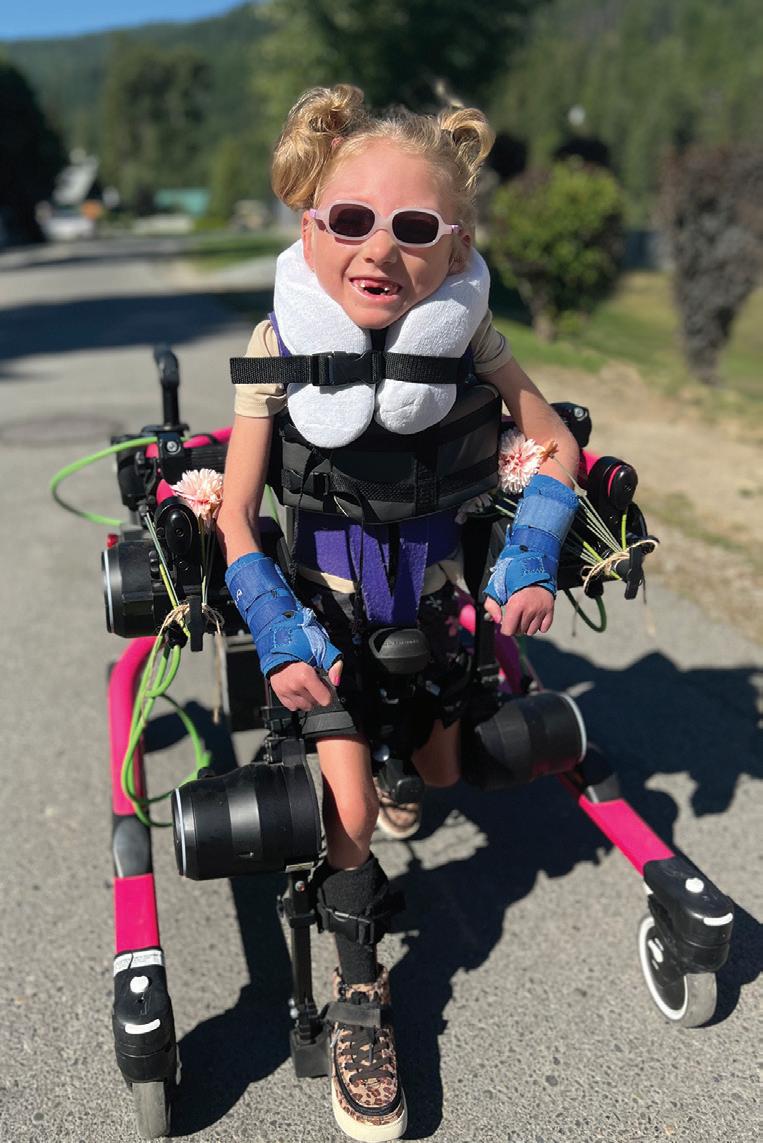
the world and we know with our incredible specialists and generous support from our community, anything is possible.”
This spring Claire was named as the 2024 Champion, part of the Children’s Miracle Network Champions Program sponsored by Walmart Canada, The Brick and Air Canada Foundation. The Champion is a child who has risen above their diagnosis, and as the official ambassador for the 100,000 kids cared for at the hospital each year, has shown inspiring strength and bravery.
“For everything she has accomplished and is yet to accomplish as a pioneer of technology like BCI, Claire is a true Champion,” says Saifa Koonar, President and CEO of the Alberta Children’s Hospital Foundation. “She brings us all so much joy and her inspirational story is an example of how community support can be truly life-changing for kids like her.”
$1.3 million Grand Prize home in Walden: 2,551 sq ft • 4 bedrooms • 3.5 bathrooms
Get your Children’s Hospital Lottery tickets today and help families like Cedric’s breathe easier
1 ticket for $100 or 5 for $200!
childrenshospitallottery.ca
Lottery Licence 683010, 683011, 683013

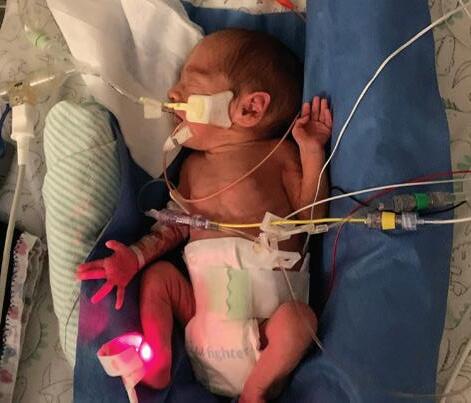

In the aftermath of the COVID-19 pandemic, doctors are seeing more kids and teens struggling with their mental health — and many are being prescribed medication as part of their treatment.
For a child who is suffering from anxiety or depression, the right medication can be transformative. Unfortunately, finding that right medication — and the right dose — isn’t always easy. Drugs can affect kids in different ways and studies show that almost half will not improve or, even worse will suffer an adverse reaction. For young people already trying to manage anxiety or depression, it’s not healthy. For their helpless parents, this trial-and-error process is heartbreaking to watch.
“Antidepressants take up to eight weeks to work,” says Dr. Chad Bousman, a pharmacogeneticist within the Alberta Children’s Hospital Research Institute (ACHRI) at the University of Calgary. Dr. Bousman and his team study how genes affect a child’s response to drugs — specifically those used to treat mental health issues. “If you have to wait that long to find out it doesn’t work, and then you have to move
on to another medication and wait eight weeks more, you can see how that just isn’t helping patients or their families.”
With support from our generous community, Dr. Bousman has created Canada’s first evidence-based pharmacogenetic testing service in child mental health with the ultimate goal of helping families avoid this upsetting odyssey.
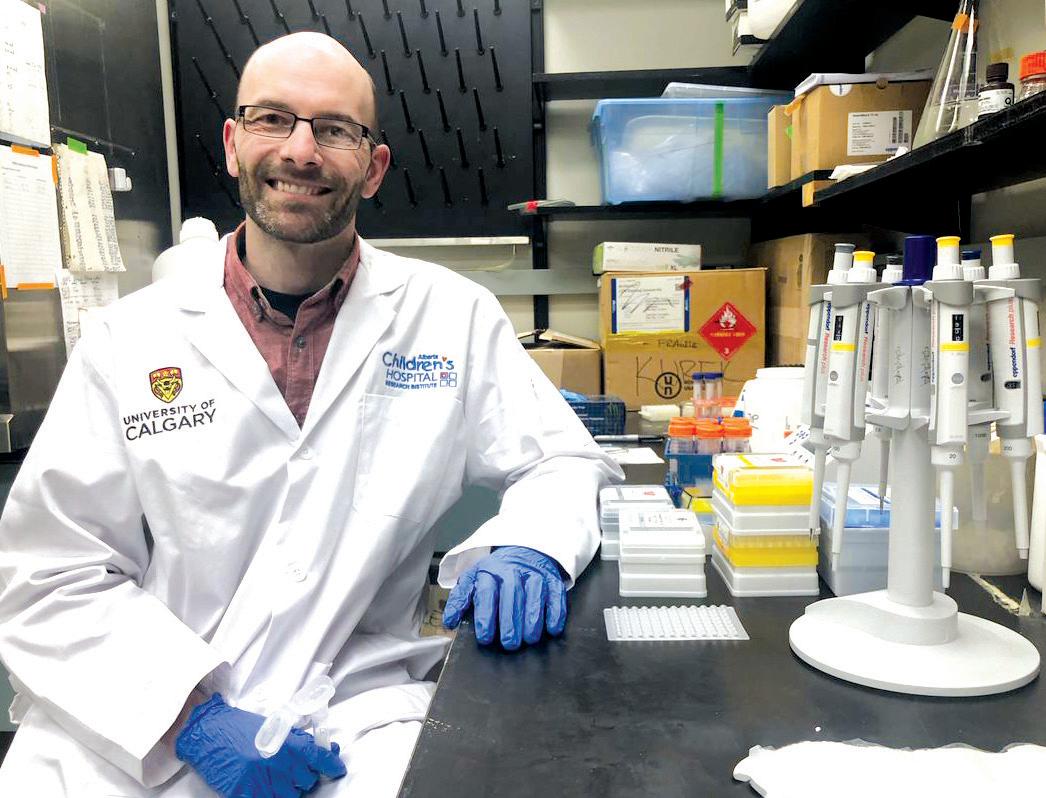
With referrals from physicians and clinics across western Canada, he and his team have collected genetic information from over 1,000 patients via a saliva sample. That DNA has been analyzed to identify who will metabolize selected depression/anxiety drugs properly, and who will not. Based on the patient’s unique metabolic profile, an informed recommendation around medications and proper dosage can then be provided to their clinician — potentially saving months of waiting and wondering if a drug is going to have the desired effect.
Feedback from clinicians and families has been overwhelmingly positive. Forty-eight percent of participants reported improved outcomes by taking prescriptions informed by the testing, with 42 percent experiencing a reduction in adverse drug reactions. Understandably nervous about putting their children on medication, parents report feeling comforted that the drugs will be selected based on their child’s specific genetic profile. Referring physicians are equally enthusiastic, stating that this testing makes it possible for them to provide more personalized care for patients.
The success of this project has inspired another study aimed at identifying biomarkers to inform prescription of psychostimulants (specifically methylphenidate — commonly known as Ritalin) to treat attention deficit/ hyperactivity disorder (ADHD).
In collaboration with community pediatric clinics and Primary Care Networks, the research team aims to enlist 400 participants diagnosed with ADHD who have not previously tried methylphenidate, but are intending to start. Participants will provide baseline clinical measurements and after four weeks of methylphenidate treatment, they will provide a saliva sample for DNA analysis, a blood sample to assess methylphenidate levels and a repetition of the initial clinical measures.
Through this study, the team seeks to unveil genomic profiles that exhibit positive responses to the treatment, as well as those that either do not respond well or experience significant side effects. Ultimately, the insights gained can be used by clinicians to enhance their treatment strategies for children with ADHD.
While findings from Dr. Bousman’s studies are being published in notable medical journals, he knows it is equally critical to get this information into the hands of frontline practitioners. Engaging software engineering colleagues across campus, he created “Sequence2Script” — a program that analyzes all pharmacogenetic medication guidelines against patient genetic information and produces an easily understandable report for both patients and healthcare providers. This web-based offering was developed with support from the UCEED Child Health and Wellness Fund — an early-stage investment fund backed by donors to the Alberta Children’s Hospital Foundation who want to make a positive economic and community impact by helping UCalgary researchers get their discoveries to market.
For more information, visit childrenshospital.ab.ca/uceed 1.

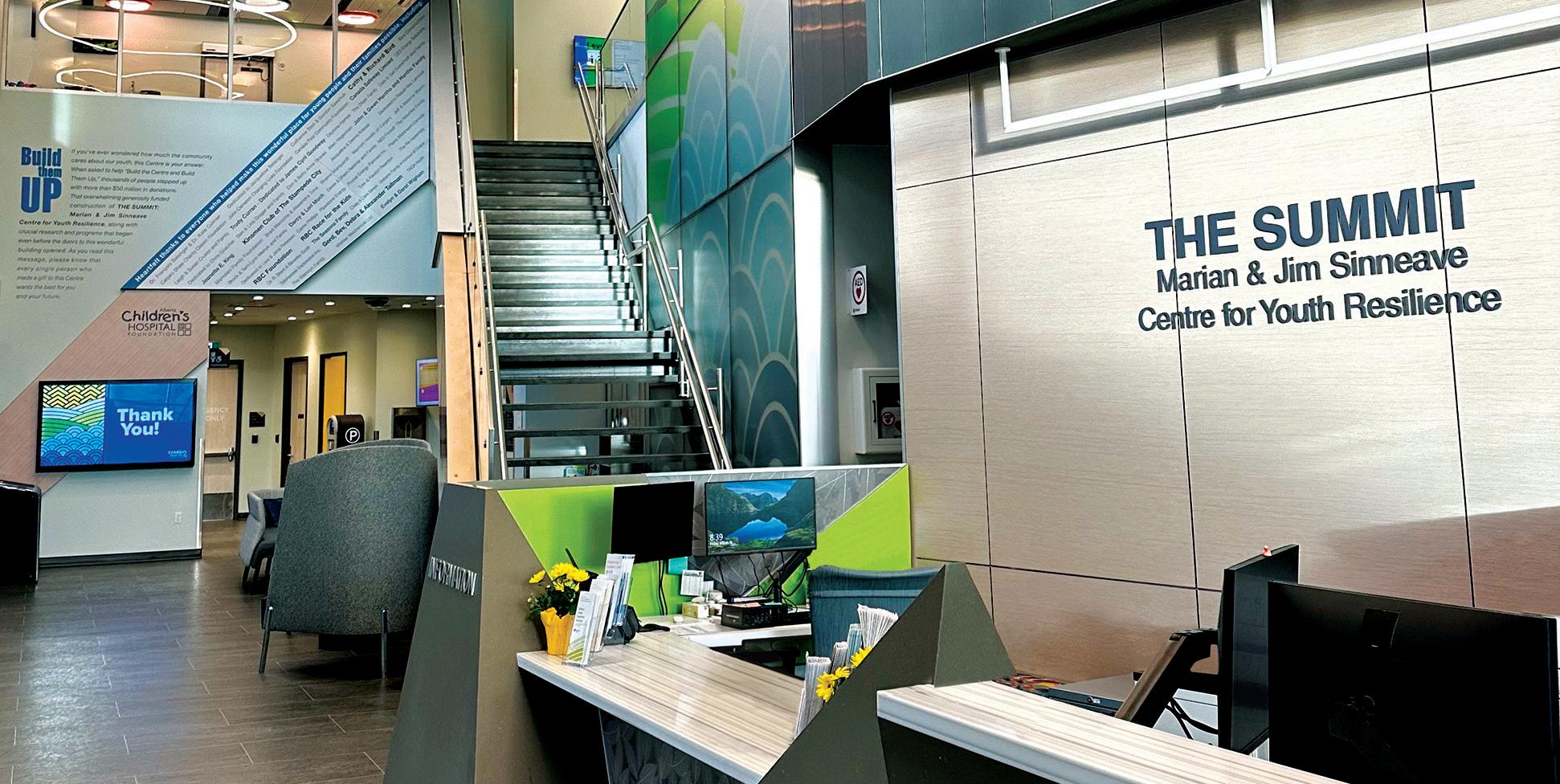
It’s been just over a year since the doors opened to Calgary’s first dedicated centre for child and adolescent mental health — The Summit: Marian & Jim Sinneave Centre for Youth Resilience.
Program manager Ryan Clements says that while the centre’s impact can be seen in its numbers, more importantly, those numbers represent young people getting care when and where they need it.
“Beyond feeling taken care of, I think they feel valued,” Clements says.
To date, while the average age of people seeking out services at The Summit has been 14, the team has helped children as young as four years old.
Thanks to generous community support, each part of The Summit and its programming has been tailor-made for young people and their mental health.
The centre offers therapeutic support for kids, teens and their families through three new resources: the Owerko Family Walk In Services, the Ptarmigan Day Hospital and the Tallman Family Treatment Services.
Within a year, it has changed the mental health landscape for Calgary youth and families, giving them an appropriate place to turn for help that is fully equipped and ready to support them on their individual journeys.
“You can see that it gives families more options for supports that fit their particular circumstances,” says Clements. “For example, when some young people have not felt ready for walk in services, their parents have come to The Summit on their own. Many of those counselling sessions have turned out to be game changers for the family.”
Each month has been busier than the last, as the team at The Summit helps tackle the rising demand for mental health services.
Clements says he is immensely grateful to the community, which funded construction of this world-class space in Calgary, along with innovative programs and research enhancements.
“It makes such a difference — the staff feel it, and the kids and families who rely on care here most definitely feel it,” he says.
3,600 counselling sessions provided through walk in services
200 children, youth and families provided programming through the day hospital
133 children and youth provided intensive community treatment services
The Summit was built thanks to the overwhelming generosity of thousands of donors through the Alberta Children’s Hospital Foundation, and in partnership with Alberta Health Services and the University of Calgary.
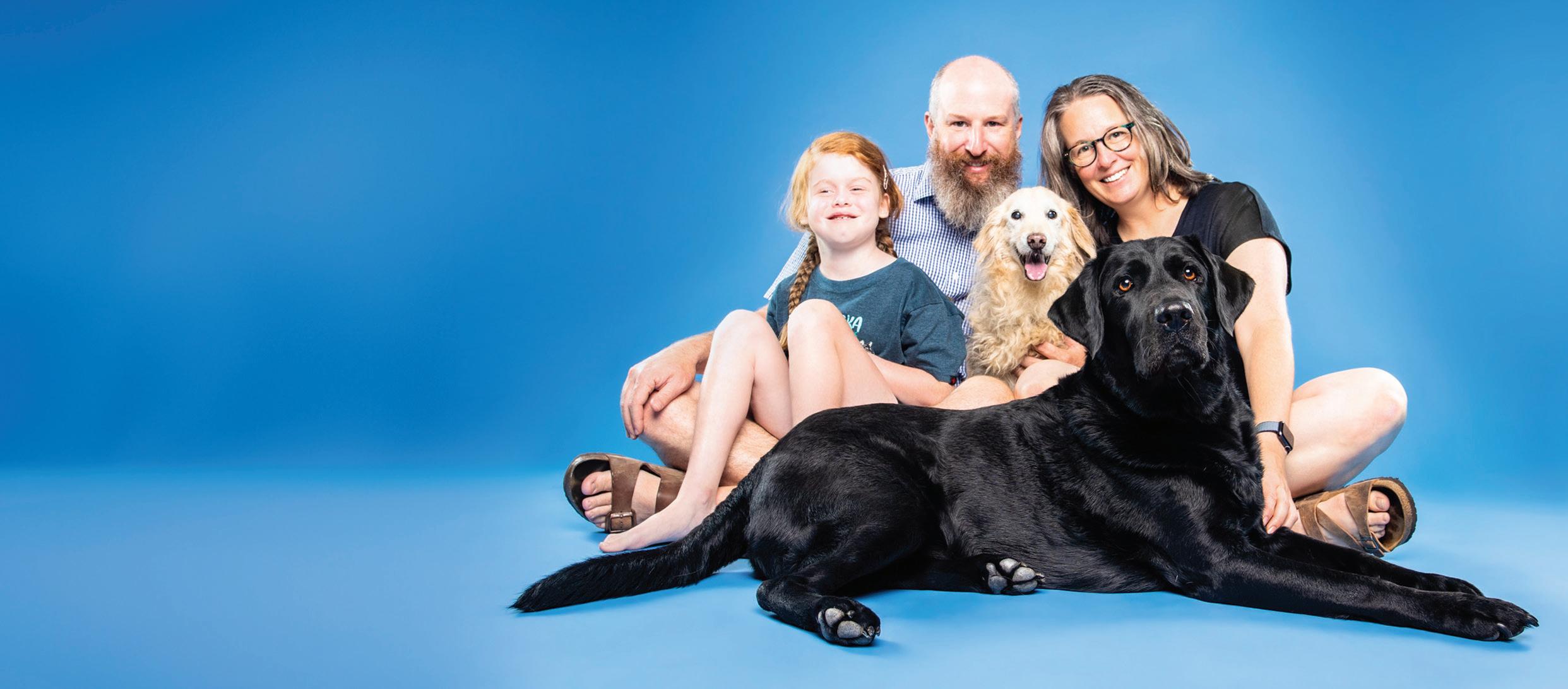
Funny, outgoing, energetic — and incredibly passionate about music. That’s how Marie-Claire remembers her daughter, Evelyn.
Evelyn was born with Hao-Fountain syndrome, a rare genetic disorder. She was often at the Alberta Children’s Hospital, battling infections, recovering from multiple heart and abdominal surgeries and receiving frequent treatments.
“When she was little — two or three — if we drove by without going in, she would get upset,” Marie-Claire says.
It’s where she learned preschool songs and spent countless hours with talented music therapist, Sarah Van Peteghen. For Evelyn, who had music on almost all the time — including the Jonas Brothers, Ed Sheeran, Shawn Mendes — those were the things that allowed her to just be a kid.
“Her whole body language changed when she was listening to music. She danced and ran around and it just energized her,” Marie-Claire says.
When Evelyn passed away at age eight in 2022, the family chose to remember her by raising money for the programs that were important to her. Marie-Claire and her husband, Mike, knew that’s exactly what she would have wanted.
“She’d said many times, actually, the months before she died, she wanted to do a fundraiser for the hospital,” Marie-Claire says. The family established the Evelyn Shanahan Endowment Fund for Creative Play in support of music and art therapy at the hospital.
Donations began coming in from those who had known Evelyn, and the initiative to honour her legacy snowballed into further fundraising events like the dog-friendly fair, Pupchella.
Evelyn’s grandmother, Liz, says after receiving so much generous support through the fund, the family decided they
wanted to take another step to benefit future generations of children.
Both Evelyn’s parents, Marie-Claire and Mike, and grandparents, Liz and Kieran, made the decision to leave a gift in their Wills — also known as legacy gifts — to support arts programming at the Alberta Children’s Hospital into the future.
Liz says it’s a way to remember what it was like watching Evelyn enjoy the music therapy program — playing instruments and spending time with Sarah.
“Therapy programs really change the experience for children who are in the hospital,” she says.
For Marie-Claire, directing funds toward the things Evelyn cared about feels, in a way, like they are leaving the money for her. It’s also the family’s way of saying thank you to the community, who helped ensure those programs were there for Evelyn. “We’re now doing the same thing.”
Have you considered leaving a legacy gift to the Alberta Children’s Hospital Foundation? To learn more visit childrenshospital.ab.ca/legacygiving

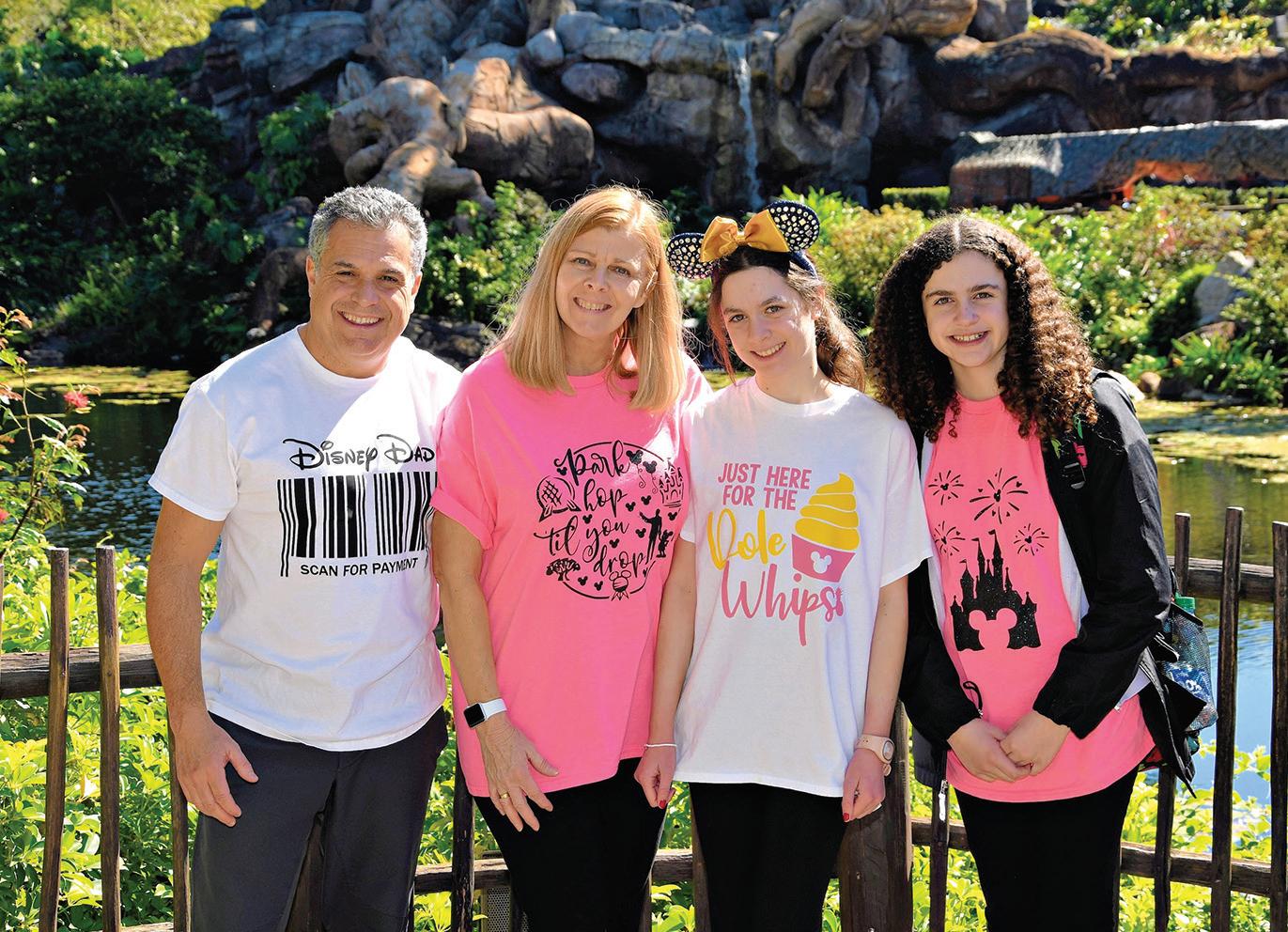
In the spring of 2009, Traci and Tony Migliarese were elated to become parents to twin girls, Lauren and Kennedy. They were thrilled to count 20 fingers and 20 toes and enjoy double the kisses and cuddles.
On the day she was born, though, they had no idea that Lauren had a serious problem with her heart. That is, until it nearly stopped.
After a healthy pregnancy, Traci and Tony were completely shocked when doctors

told them Lauren had a serious heart defect called pulmonary atresia intact ventricular septum. The valve controlling blood flow from the heart to the lungs was not fully formed, and the right ventricle was underdeveloped.
As soon as she was born, Lauren struggled to breathe. Rather than spending the next couple days in her parents’ arms, she was in an operating room, undergoing urgent open-heart surgery.
As they spent that summer isolating themselves from visitors to avoid infecting Lauren with illnesses, Traci and Tony scrambled to learn as much about their baby’s condition as possible. At five months old, she underwent her second major operation to fix her heart at the Stollery Children’s Hospital in Edmonton, the province’s pediatric cardiac surgical centre. While recovering from complications from the surgery, the family was grateful to spend eight weeks at the Alberta Children’s Hospital with their home team of cardiology experts, all while learning to navigate their new busy life with twins.
For the last decade, congenital heart defects have been on the rise in Alberta, often leading to emergency interventions at birth and lifelong illnesses for children like Lauren. Now a teenager, she has spent her entire life under the watchful eyes of her cardiology team at the Alberta Children’s Hospital.
“We’ve been so grateful for the care Lauren and our entire family have received on this journey,” says Tony. “However, it was gut-wrenching learning about our baby girl’s heart condition as she was hooked up to oxygen support and machines. Knowing ahead of time that we’d be walking this road would have made those early days and months so much easier.”
Twenty-five years ago, babies like Lauren may not have survived. Community support helps to advance care for children born with serious heart defects so not only can they survive, they can thrive. However, further research is needed to uncover why heart defects in children occur and what can be done to treat or even prevent them.
Now, a team of scientists at the Alberta Children’s Hospital Research Institute believe earlier identification of heart defects is possible through a simple blood test. Their work has the potential to revolutionize prenatal care here and around the world, giving babies born with heart defects the best chance at a healthy life.
Every year in Alberta, up to a 1,000 babies are born with congenital heart defects, and in half of those cases, their parents were completely unaware.
Your gift today in support of innovative research can help make earlier detection of congenital heart defects possible and make a life-saving, life-changing difference for hundreds of babies each year.
Thanks to generous support from CPKC, all donations made in response to Lauren’s story will be matched to go twice as far.
To donate, please use the enclosed postage-paid return envelope to mail in your gift, scan the QR code below, or visit childrenshospital.ab.ca/Hope
“I am so thankful to everyone who had a hand in saving my life,” says Lauren, who today is a healthy, active volleyball player. “Because of them, I can do all the things my friends can do, and my wish for all babies born with conditions like mine is that they get the chance to grow up healthy, too.” Scan

July 23-28, 2024 | Earl Grey Golf Club
The Alberta Children’s Hospital Foundation is proud to be the charity partner for the tournament, with all funds raised supporting innovative pediatric cardiac research. CPKC will generously match all donations made online until July 28, 2024.

Walmart CMN Campaign
April 18 – June 6
Costco CMN Campaign
April 29 – June 2
Children’s Hospital Lottery
Tickets on sale
May 16 – July 24
Life Cycle
June 1 – 30
Kids Helping Kids Junior Golf Classic
June 9
June 15
Northstar Ford Poker Tournament
June 22
CF Chinook Stampede Breakfast
July 6
CPKC Women’s Open
July 23 – 28
RE/MAX Month of Miracles
August 1 – 31
Dairy Queen Miracle Treat Day
August 8
RBC Race for the Kids
September 8
Sobeys Family of Support Campaign
September 19 – October 6
For more information, check out the ‘Events’ and the ‘Shop + Support’ sections on our website, childrenshospital.ab.ca